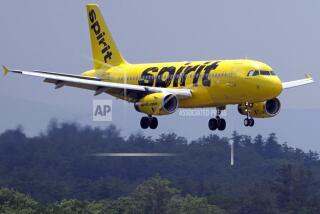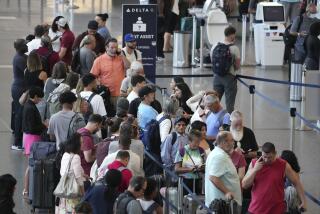Tragedy Creates Further Risks for TWA
- Share via
NEW YORK — Wednesday night’s explosion and crash of a Trans World Airlines jumbo jet off Long Island, N.Y., sparked fears among travelers that spilled over onto Wall Street on Thursday.
Despite a broad rally in the rest of the stock market, shares of TWA and other major U.S. airlines slumped badly as investors figured that the disaster would hurt ticket sales. TWA’s stock lost 9% of its value, dropping $1 to $10.25 in trading on the American Stock Exchange.
The crash puts the financially weak TWA in a critical situation, where its own response can either limit the damage or cause the public to lose confidence in the venerable carrier, experts said.
New York City Mayor Rudolph W. Giuliani and Gov. George Pataki both criticized the airline’s early handling of the passenger lists on the downed 747, bound for Paris from New York’s John F. Kennedy Airport with 230 people aboard.
Beyond TWA’s control, on the other hand, is the possibility that travelers will cancel or postpone trips across the board, as has sometimes happened after highly publicized air disasters.
“It’s what I call the ‘low-probability hysteria’ that always hits after a crash,” said Sheryl Spivack, director of George Washington University’s International Institute of Tourism Studies.
Although there was no sign of a significant change in booking patterns Thursday, travel agents reported receiving numerous calls from worried customers, and there were isolated examples of a drop-off in business.
For example, airline industry analyst John Pincavage of Dillon Read & Co. said: “A small jet carrier, with no international flights and nothing to do with TWA, told me that bookings were down 10% to 15% this morning.”
There is no question that a crash can endanger the survival of a weak airline. Pan American World Airways went out of business in large part because of a sharp decline in ticket sales after the 1988 explosion and crash of one of its 747s over Lockerbie, Scotland, in a terrorist attack.
“Lockerbie was the straw that broke the camel’s back for Pan Am,” said analyst Steven Lewins at Gruntal & Co. in New York.
The TWA crash came on the same day that the airline reported its sixth straight quarter of improved earnings, buoyed by a strong travel market that has boosted the whole industry. TWA also has doubled its cash on hand in the last year, to $300 million. Nevertheless, the company remains financially vulnerable, burdened with high debt and one of the industry’s oldest jetliner fleets. It emerged from bankruptcy protection only last August.
The key for TWA will be the result of the crash investigation.
If the findings point to equipment or maintenance problems, the flying public may blame the company and stay away, experts said.
The May 11 crash of a ValuJet airliner in the Florida Everglades, which killed 110 people, sparked an investigation that led federal regulators to ground the carrier because of maintenance concerns.
Similar results in the TWA crash could spark a “flight to quality” by American travelers, leading them to switch to airlines perceived as financially stronger and with top-notch safety records, one analyst said. If, instead, the crash is determined to have been a terrorist act not specifically linked to TWA, the reaction may spread more widely.
Although Giuliani and Pataki took TWA to task for delays in releasing information about the passenger list, the airline deserves the benefit of the doubt in the early hours of such a crisis, said Robert Irvine, president of the Institute for Crisis Management, a private consulting firm in Louisville, Ky.
“The amount of chaos, the way information just ricochets, is impossible for anybody who has not been in the situation to appreciate,” he said.
Crisis communications failures--such as those exhibited by Exxon Corp. after the Exxon Valdez Alaskan oil spill or by Intel Corp. after early problems with its much-touted Pentium computer chip--can cause permanent damage, Irvine said. For a company with TWA’s financial vulnerability, such a failure could be fatal.
One action TWA took to smooth its public relations was to offer refunds--immediate, no questions asked and no penalties--to passengers who wanted to cancel their trips. A TWA reservations official, who asked not to be identified, said that although few passengers were canceling their bookings Thursday, some were postponing trips.
The broader effects of the crash on travel were hard to quantify.
“So far, there is no perceivable sales drop or any widespread moving away from TWA,” said Jeanie Thompson-Smith, president of Topaz Enterprises, a Portland, Ore.-based travel auditing firm.
More to Read
Inside the business of entertainment
The Wide Shot brings you news, analysis and insights on everything from streaming wars to production — and what it all means for the future.
You may occasionally receive promotional content from the Los Angeles Times.










